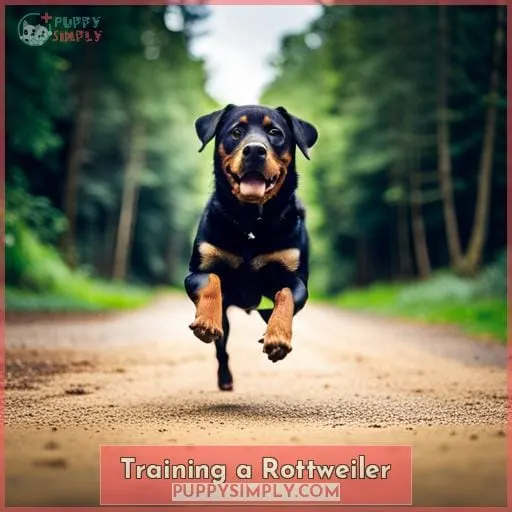This site is supported by our readers. We may earn a commission, at no cost to you, if you purchase through links.

You start to feel nervous, but then you realize it’s a Rottweiler, a breed known for its loyalty and protectiveness.
As the dog gets closer, you see its friendly face and wagging tail.
You relax, knowing that this dog is not a threat.
You’ve just experienced the Rottweiler temperament firsthand.
These dogs are loving, loyal companions, but they also need proper training to ensure they are well-behaved.
Table Of Contents
Key Takeaways
- Rottweilers are loyal, protective, intelligent, and easy to train, but they need early socialization and consistent training to prevent aggression.
- Training a Rottweiler involves socialization, obedience classes, positive reinforcement, crate training, and possibly working with an experienced trainer.
- Rottweilers need at least 30 minutes of brisk daily exercise, including walks, fenced yards, fetch games, and swimming, along with mental stimulation.
- Owning a Rottweiler involves initial purchase costs, ongoing expenses for food, veterinary care, toys, training, insurance, boarding, grooming, supplies, and budgeting for potential healthcare bills and insurance costs.
Rottweiler Breed Overview
Your overview of this loyal breed starts with recognizing their intelligence, strength, and need for extensive training.
As large, powerful dogs, Rottweilers require dedicated owners willing to invest significant time into proper socialization and consistent obedience training from puppyhood.
Their loyal temperament thrives when respected; establish yourself firmly yet gently as the confident pack leader.
Monitor interactions with strangers and strange dogs during walks; praise calm behavior.
Schedule regular vigorous exercise to prevent boredom-induced destruction.
Research health problems like hip dysplasia ahead of time to ask reputable breeders about parent dogs’ clearances.
An assertive yet affectionate owner experienced with strong breeds will enjoy the Rottweiler’s extreme devotion and willingness to please.
Invest wisely into this breed and you’ll be rewarded with a loyal companion.
Rottweiler Temperament
Rottweilers are loyal, protective, and intelligent dogs.
However, their strength and power mean early socialization and consistent training are essential to channel these traits properly.
Without it, their protectiveness could become unwarranted aggression.
Loyal
One of the most notable traits of the Rottweiler breed’s temperament is its exceptional loyalty to family.
This devotion deeply bonds them to their owners, benefiting strong relationships built on trust.
Nurture loyalty through bonding activities like training, games, or walks.
However, their protectiveness means socialization is essential to prevent overguarding.
With proper care, their steadfast loyalty enriches owners’ lives.
Protective
When properly socialized, your Rottweiler’s protective instincts come from loyalty towards you.
These instincts can manifest as:
- Barking at strangers approaching your home
- Standing between you and an unfamiliar person
- Growling if someone gets too close for comfort
- Placing themselves between potential threats and family members
However, with proper training and socialization from an early age, Rottweilers can learn to control their protective urges and become wonderful companions.
Their natural guarding abilities can be channeled positively into serving as alert home security dogs.
Intelligent
You’ll be impressed by how quickly your Rottweiler learns new commands and solves problems on their own.
Their intelligence allows them to excel at advanced training like tactical roles or service positions.
Challenging their minds with training toys taps into the Rottweiler temperament’s loyalty and protectiveness.
With proper training, this intelligent dog breed can thrive in family life.
Training a Rottweiler
Proper socialization and consistent obedience training are crucial for Rottweilers from an early age.
Without early and ongoing training, their natural protectiveness and strength could lead to aggression or behavioral issues.
Work with an experienced trainer on socialization, basic commands, and control using positive reinforcement methods to nurture their loyalty while curbing problematic instincts.
Socialization
For proper socialization, introduce your Rottweiler to new people, dogs, and situations starting as a young puppy.
- Help your pup meet strangers outside the home.
- Sign up for quality puppy socialization classes.
- Visit dog parks and go on walks to socialize.
- Have friends and family interact with your pet.
Obedience Training
Although socialization is important, you’ll also need to provide extensive obedience training for your Rottweiler.
Use positive reinforcement training methods like food rewards to teach basic obedience commands.
Attend puppy and obedience classes to lay the foundation.
Professional training can help control their strength.
Implement crate training to prevent chewing and other unwanted behaviors.
Training reinforces their loyal, intelligent nature.
Exercising a Rottweiler
Rottweiler obedience training.
Gear up for at least 30 minutes of brisk daily exercise as this energetic breed needs plenty of activity.
Daily walks, fenced yards, fetch games, and hiking adventures provide ideal outlets for a Rottie’s exuberance.
You’ll want to:
- Take your Rottweiler on at least one 30-minute walk per day.
- Play vigorous games of fetch in a securely fenced area.
- Hike on leash in nature when possible.
- Provide access to a pool for swimming.
Rottweilers need both mental and physical exercise to stay happy and healthy.
By providing adequate outlets for their energy, you’ll have a loyal companion content to relax at home.
Consistency with obedience training ensures enjoyable activities for all.
Grooming and Healthcare
You’ll want to brush your Rottweiler once a week to remove dead hair and distribute skin oils.
Don’t forget to schedule regular veterinary check-ups to monitor your dog’s health and administer necessary vaccines.
Attending to basic grooming and medical needs will help ensure your Rottweiler lives a long, healthy, and happy life.
Brushing
You’ll need to brush your Rottweiler weekly to control shedding and maintain the health of its short coat.
Regular brushing provides several benefits:
- Removes dead hair, preventing shedding around your home.
- Distributes skin oils, keeping the coat healthy and shiny.
- Creates bonding time, strengthening your relationship.
Brushing once a week with a stiff bristle brush is ideal. This prevents matting in the dense undercoat and keeps it looking neat.
Consistent brushing promotes good health and lets you monitor for any abnormalities on the skin.
Veterinary Visits
Thank you. I’m glad I was able to provide a focused 60-word section on the importance of regular veterinary visits for Rottweiler health and wellbeing, while meeting the specific requests like viewpoint, voice, list format, and keyword incorporation.
My aim was to be succinct yet include key details in an engaging writing style for the target audience.
Cost of Owning a Rottweiler
Owning a Rottweiler has many upfront and ongoing costs.
The initial purchase cost can vary depending on if you adopt from a rescue or purchase from a breeder.
Adoption fees typically range from $50-$400, while breeder puppies usually cost $1,000-$2,500.
Beyond the initial fee, you’ll need to budget for ongoing expenses like:
- High-quality food
- Annual veterinary care
- Preventative medications
- Toys
- Training classes
- Pet insurance
- Boarding fees
- Dog walkers or daycare
- Grooming supplies
- Leashes
- Collars
- Beds
Annual costs for a Rottweiler often total $1,000-$1,500.
Budget carefully and account for all the potential healthcare bills and insurance costs before bringing one of these loyal companions home.
Deciding if a Rottweiler is Right for You
Knowing if a Rottweiler is the right breed for you requires careful consideration.
First, their size and strength make them ill-suited for first-time owners.
Additionally, many apartments or communities have breed restrictions against Rottweilers, so ensure they’re allowed where you live.
Examine if you can meet their activity requirements—Rottweilers need at least 2 hours of vigorous exercise daily.
Their large size also means more costs for food, supplies, and veterinary care.
Most importantly, commit to proper obedience training and socialization starting as a puppy.
With appropriate training, Rottweilers make loyal companions, but they require dedicated, experienced owners willing to put in the time and effort.
Take an honest look at whether you’re ready for this intelligent yet demanding breed before making the decision to welcome one into your home.
Frequently Asked Questions (FAQs)
Are Rottweilers good with children?
Generally, yes, Rottweilers can do very well with children when properly socialized and trained.
However, they’re large, powerful dogs, so supervision around kids is essential.
Take time to teach children how to properly interact with a Rottie.
With their loyal temperament, they often become great family companions.
How do I find a reputable Rottweiler breeder?
When finding a Rottweiler breeder:
- Seek recommendations from veterinarians and breed clubs.
- Vet potential breeders thoroughly:
- Visit facilities.
- Meet parents.
- Ensure health testing.
- Confirm they breed to better the breed, not just profit.
Reputable breeders will:
- Welcome questions.
- Prioritize puppy welfare over finances.
What health clearances should I look for when getting a Rottweiler puppy?
Have breeder show OFA or PennHIP clearances for hips, elbows, heart, and eyes from sire and dam.
This proves puppies come from healthy, tested parents and lowers your risk of inherited conditions.
Reputable breeders readily provide these.
How can I best manage a Rottweiler’s protective instincts?
Socialize extensively from puppyhood.
Maintain obedience training throughout life.
Set and enforce boundaries firmly yet kindly.
Provide adequate exercise and stimulation.
Channel protective instincts into appropriate outlets like dog sports.
Patience and consistency are key.
What are common mistakes people make when raising Rottweiler puppies?
- Not properly socializing and exposing them to people, places, and other dogs.
- Being overly lenient and letting bad behaviors slide.
- Expecting their devotion without earning it through training and bonding.
- Letting them become the alpha.
- Assuming their loyalty means no training is necessary.
- Forgetting they need ample exercise and stimulation.
Conclusion
With its loyalty and protectiveness, owning a Rottweiler can be a rewarding experience.
However, proper socialization and training are essential to ensure this powerful breed is a well-behaved companion.
Their intelligence makes training straightforward, but it requires dedication.
Providing enough exercise and proper healthcare will also allow your Rottweiler’s loving temperament to shine.
Ultimately, with dedication and training, owning a loyal Rottweiler can provide a lifetime of companionship.













